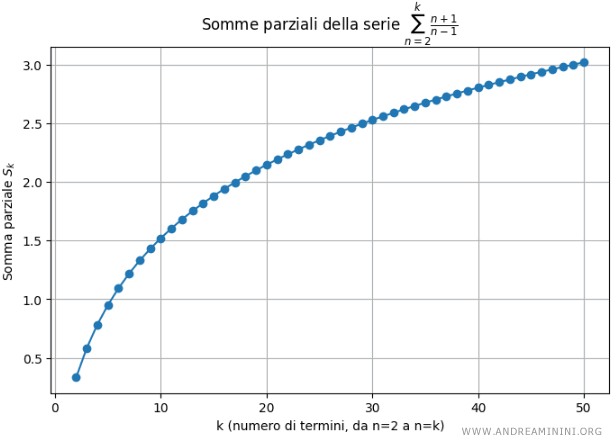Step-by-step solution: Analysis of the series $ \sum_{n=2}^{\infty} \frac{n+1}{n-1} $
In this exercise, I’m analyzing the series
\[ \sum_{n=2}^{\infty} \frac{n+1}{n-1} \]
The index starts at 2 to avoid division by zero.
By inspecting the general term, it becomes clear that it can be rewritten in a more manageable form to facilitate the analysis.
I express the numerator $ n+1 $ as $ n - 1 + 2 $, which yields:
$$ \frac{n+1}{n-1} = \frac{n - 1 + 2}{n - 1} $$
$$ \frac{n+1}{n-1} = \frac{(n - 1) + 2}{n - 1} $$
$$ \frac{n+1}{n-1} = \frac{n-1}{n-1} + \frac{2}{n - 1} $$
$$ \frac{n+1}{n-1} = 1 + \frac{2}{n - 1} $$
This allows us to rewrite the original series as:
$$ \sum_{n=2}^{\infty} \left(1 + \frac{2}{n - 1}\right) $$
Now, applying the linearity of summation, we have:
$$ \sum_{n=2}^{\infty} 1 + \sum_{n=2}^{\infty} \frac{2}{n - 1} $$
$$ = \sum_{n=2}^{\infty} 1 + 2 \cdot \sum_{n=2}^{\infty} \frac{1}{n - 1} $$
This representation is more convenient for determining the convergence of the series.
The first sum, \( \sum_{n=2}^{\infty} 1 \), is the infinite sum of the constant 1, which clearly diverges. The second sum, \( \sum_{n=2}^{\infty} \frac{1}{n - 1} \), is the harmonic series shifted by one index (with $ k = n - 1 $), starting at 2 - and it, too, diverges.
Therefore, we conclude that the series diverges.
$$ \sum_{n=2}^{\infty} \frac{n+1}{n-1} = \underbrace{ \sum_{n=2}^{\infty} 1}_{\text{divergent}} + 2 \cdot \underbrace{ \sum_{n=2}^{\infty} \frac{1}{n - 1} }_{\text{divergent}} $$
Hence, the series $ \sum_{n=2}^{\infty} \frac{n+1}{n-1} $ diverges.

And so on.
